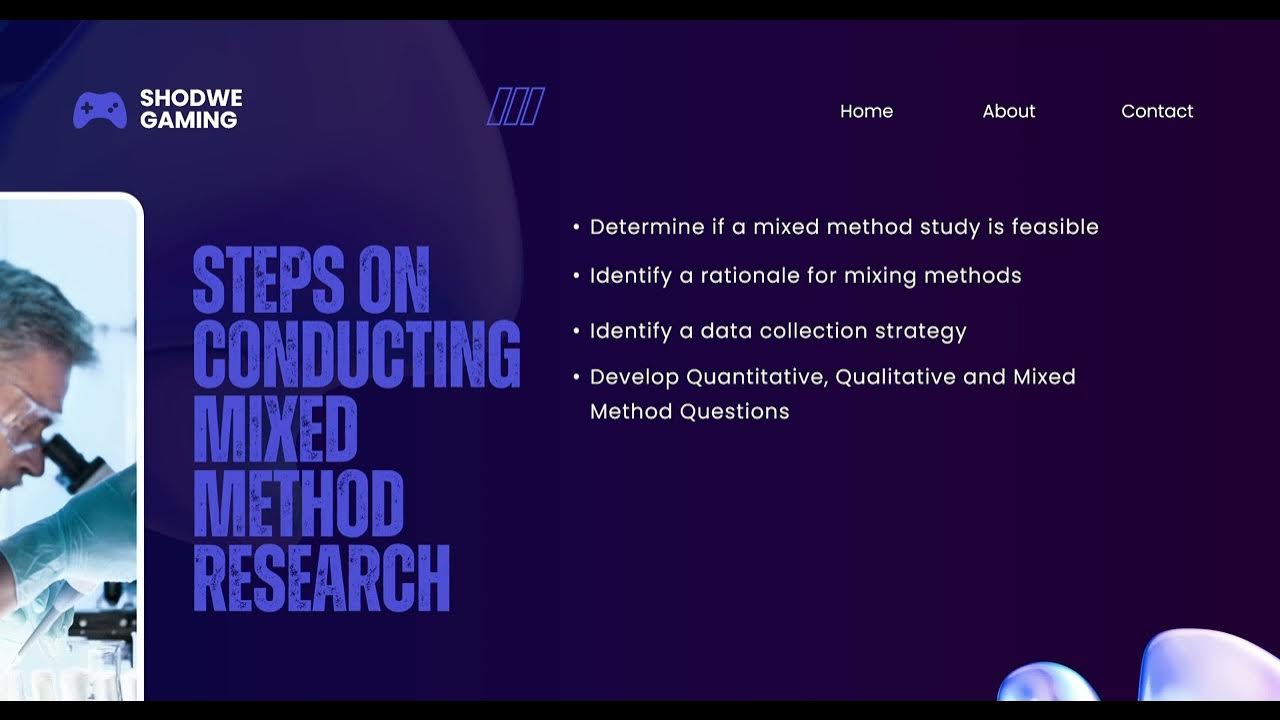Philosophical assumptions, paradigms and worldviews in mixed methods research
Summary
TLDRIn this educational video, the speaker addresses the philosophical dilemmas of conducting mixed methods research, which combines quantitative and qualitative data collection. Traditionally, quantitative methods align with positivism, emphasizing objectivity and stable structures, while qualitative methods are linked to interpretivism, focusing on dynamic and individual perspectives. The speaker critiques the approach of shifting between these paradigms during a study and instead advocates for pragmatism, a flexible worldview that prioritizes answering research questions effectively, regardless of methodological biases. Pragmatism reconciles the tension by valuing both individual interpretations and the recognition of stable social structures, providing a balanced perspective for mixed methods research.
Takeaways
- 🔍 Mixed methods research combines both quantitative and qualitative data collection methods, often associated with different philosophical paradigms.
- 📊 Positivism, traditionally linked with quantitative research, emphasizes objectivity, stability, and scientific inquiry.
- 🌐 Interpretivism, often associated with qualitative research, views the world as dynamic, flexible, and dependent on individual perspectives.
- 🤔 The challenge in mixed methods studies is reconciling these contrasting worldviews and justifying their use within the same research.
- 🔄 One approach suggests starting with a positivist worldview using quantitative methods and shifting to an interpretivist approach with qualitative methods.
- 🚫 The speaker personally dislikes the idea of shifting worldviews, preferring a more consistent philosophical stance throughout the research.
- 🛠 Pragmatism is introduced as a flexible worldview that can accommodate both positivist and interpretivist approaches, focusing on what works to answer research questions.
- 🔑 Pragmatists value empirical observation and acknowledge the constructed nature of reality by individuals, while recognizing stable social structures.
- 🔄 Pragmatism encourages the use of any method that effectively answers research questions, blending elements from both positivism and interpretivism.
- 📚 The speaker recommends exploring pragmatism for those confused about choosing a worldview, especially when conducting mixed methods studies.
Q & A
What is the main topic of the video?
-The main topic of the video is the discussion of philosophical assumptions and worldviews in the context of mixed methods research, which combines both quantitative and qualitative methods of data collection.
What are the two main philosophical paradigms discussed in the video?
-The two main philosophical paradigms discussed are positivism and interpretivism, which are traditionally associated with quantitative and qualitative research methods, respectively.
What is positivism and how does it relate to research methods?
-Positivism is a philosophical worldview that emphasizes scientific inquiry, objectivity, and the stability of the world. It favors quantitative methods of data collection, such as observations or questionnaires, to minimize bias and maintain objectivity.
How does interpretivism contrast with positivism?
-Interpretivism views the world as flexible, dynamic, and dependent on the perspectives of the people within it. It prioritizes qualitative methods to gain deep understandings of individual experiences and perspectives, which are seen as constructing the social reality.
What is the issue with combining quantitative and qualitative methods in a mixed methods study?
-The issue is that these methods are traditionally associated with contrasting worldviews, leading to questions about which worldview to adopt or how to justify using both methods in a single study.
What are the two main approaches to addressing the issue of worldviews in mixed methods research?
-The two approaches are: 1) making a shift from a positivist to an interpretivist worldview as the study progresses from quantitative to qualitative methods, and 2) choosing a single worldview that suits all aspects of the study, often pragmatism.
Why might some researchers be uncomfortable with shifting between positivist and interpretivist worldviews during a study?
-Some researchers may find it uncomfortable because it implies adopting contrasting beliefs at different stages of the study, which can create internal conflicts and questions about the consistency and validity of the research.
What is pragmatism and how does it relate to mixed methods research?
-Pragmatism is a flexible philosophical approach that encourages using whatever methods work best to answer research questions. It values both the assumptions of interpretivist and positivist views, recognizing the constructed nature of reality while acknowledging stable aspects of the world.
How does pragmatism reconcile the differences between positivism and interpretivism?
-Pragmatism reconciles the differences by recognizing that reality is constructed by individuals but also represents a reconstruction of something relatively stable. It emphasizes empirical observation while acknowledging the role of the researcher's interpretation.
What advice does the speaker give to those who are confused about choosing a worldview for their mixed methods study?
-The speaker encourages those who are confused to look into pragmatism, as it offers a flexible and inclusive worldview that can accommodate both quantitative and qualitative methods.
What is the main priority of pragmatism in conducting research?
-The main priority of pragmatism in research is to answer the research questions effectively, using whatever methods are necessary to achieve that goal, without being overly concerned with the dichotomy between positivism and interpretivism.
Outlines

This section is available to paid users only. Please upgrade to access this part.
Upgrade NowMindmap

This section is available to paid users only. Please upgrade to access this part.
Upgrade NowKeywords

This section is available to paid users only. Please upgrade to access this part.
Upgrade NowHighlights

This section is available to paid users only. Please upgrade to access this part.
Upgrade NowTranscripts

This section is available to paid users only. Please upgrade to access this part.
Upgrade Now5.0 / 5 (0 votes)





